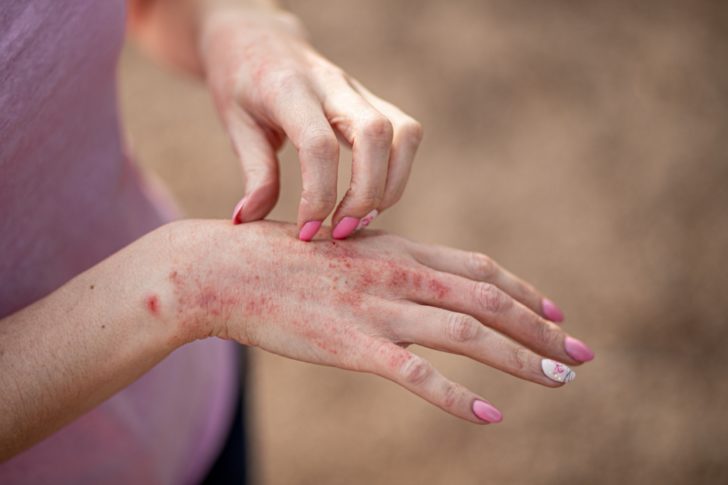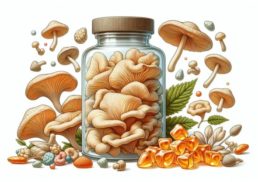Skin inflammation is an all-too common issue that can leave individuals feeling physically and emotionally drained. However, not all hope is lost. With an array of natural remedies, topical treatments, oral medications, lifestyle changes, and even medical interventions, there are numerous ways to tackle this pesky problem. One such solution is the use of anti-inflammatory agents that treat skin inflammation. Are you ready to embark on a journey towards healthier and happier skin? Let’s begin!
Table of Contents
Key Takeaways
Natural remedies, such as turmeric and aloe vera, have been used for centuries to reduce skin inflammation.
Topical treatments like corticosteroid creams and calamine lotion can provide relief from inflammatory skin disorders.
Making lifestyle changes, avoiding triggers & adhering to a nutritious diet are key steps in managing and preventing skin inflammation.
Natural Remedies for Skin Inflammation

Mother Nature has provided us with an array of powerful remedies to combat skin inflammation. Some natural ingredients that can help alleviate irritated skin and promote healing include:
Turmeric: Known for its vibrant color and anti-inflammatory properties.
Aloe vera: Known for its soothing and moisturizing effects on the skin.
Chamomile: Known for its calming and anti-inflammatory properties.
These natural ingredients have been used for centuries and can be effective in treating skin inflammation.
Turmeric and Curcumin
Turmeric, a popular golden spice, is known for its potent anti-inflammatory activity. Curcumin, the active compound in turmeric, can be more effective than ibuprofen in reducing inflammation.
Consider making this potent herb a part of your daily regimen to counter skin inflammation and enhance your overall health.
Aloe Vera
Aloe vera is more than just a popular houseplant; it’s a natural remedy with remarkable anti-inflammatory properties. Its active ingredients, such as carbohydrates and enzymes, play a crucial role in wound healing and treating inflammatory skin disorders like psoriasis.
Having some fresh aloe vera gel nearby could prove beneficial for immediate relief during acute inflammation episodes.
Chamomile
Chamomile has long been used for its calming and anti-inflammatory effects, making it a popular choice for treating various skin conditions. The active constituents of chamomile, such as chamazulene, work wonders for reducing skin inflammation and providing relief from symptoms of atopic dermatitis, rashes, and allergies.
The next time your skin yearns for relief from inflammation, chamomile-infused creams or cosmetics are worth considering.
Topical Treatments for Inflammatory Skin Disorders

Sometimes, our skin needs a little extra help to combat inflammation. Topical treatments, such as corticosteroid creams, anti-inflammatory gels and creams, and calamine lotion, can provide much-needed relief for various inflammatory skin disorders, including atopic diseases like atopic dermatitis and allergic contact dermatitis.
Corticosteroid Creams
Corticosteroid creams are effective in treating allergic contact dermatitis, moderate atopic dermatitis, and atopic eczema. Although these creams can provide relief by reducing redness, itching, and swelling, they should be used with caution due to potential side effects like thinning of the skin and altered local immune reactions.
Remember to seek advice from your healthcare professional before using corticosteroid creams for safe and effective results.
Anti-Inflammatory Gels and Creams
Anti-inflammatory gels and creams, such as non-steroidal anti-inflammatory drugs (NSAIDs), can help reduce inflammation and soothe irritated skin. However, these topical agents may cause side effects in some individuals, including skin irritation, allergic contact dermatitis, dryness, and scaling, which can lead to a skin reaction.
Before applying these products, especially if your skin has reacted to topical treatments in the past, consultation with your healthcare provider is recommended.
For more info, visit Anti-Inflammatory Creams for Pain: What You Need to Know.
Calamine Lotion
For those seeking a gentler option, calamine lotion might be the answer. This soothing lotion, known for its cooling effect and itch-relief properties, can help ease the discomfort caused by skin inflammation.
Having a bottle of calamine lotion within reach can be helpful when your skin requires a soothing and gentle touch.
Oral Medications for Skin Inflammation
In some cases, oral medications may be necessary to control skin inflammation. Two common options are antihistamines and non-steroidal anti-inflammatory drugs (NSAIDs), both of which can help reduce inflammation and alleviate symptoms.
Antihistamines work by blocking the action of histamine, a chemical released by the body.
Antihistamines
Antihistamines, often used to treat allergies, can also provide relief from itching, swelling, and redness caused by skin inflammation. These medications are available over the counter and can be effective in managing symptoms.
Yet, it’s vital to note the potential side effects like drowsiness, dry mouth, and dizziness. Always remember to consult your healthcare professional before embarking on any new medication.
Non-Steroidal Anti-Inflammatory Drugs (NSAIDs)
NSAIDs, including ibuprofen and naproxen, can help reduce inflammation and pain associated with skin inflammation. While these medications can be effective, they may cause side effects in some individuals, such as stomach upset, nausea, and headache.
Before starting a regimen with NSAIDs, it’s imperative to discuss with your healthcare provider to ensure they are suitable for your specific needs.
Lifestyle Changes and Trigger Avoidance
Preventing and managing skin inflammation often involves:
Making lifestyle changes
Avoiding triggers
Identifying triggers
Upkeeping an appropriate skincare routine
Adhering to a nutritious diet
By following these steps, it’s achievable to prevent skin inflammation and sustain a healthier, more radiant skin.
Identifying Triggers
Understanding and avoiding triggers, such as allergens, irritants, or harsh chemicals, can help prevent flare-ups of skin inflammation. This may involve paying close attention to the ingredients in your skincare products, the fabrics you wear, or even the food you consume.
Taking control of your skin’s health and preventing inflammation is possible through the identification and avoidance of triggers.
Skin Care Routine
Sustaining a suitable skincare routine is vital in warding off skin inflammation. This includes moisturizing regularly, avoiding harsh chemicals, and using gentle, fragrance-free products.
Additionally, consider incorporating ingredients known to soothe and heal the skin, such as aloe vera, niacinamide, ceramides, colloidal oatmeal, licorice extract, green tea, and centella asiatica.
Diet and Nutrition
A well-balanced diet plays a significant role in skin health, and certain nutrients, such as essential fatty acids, can help improve skin inflammation. Here are some tips to incorporate into your diet to promote healthier skin and reduce inflammation.
Include a variety of fruits and vegetables in your meals
Choose whole grains over refined grains
Incorporate healthy fats, such as avocados, nuts, and olive oil, into your diet
By following these tips, you can improve your skin health, promote the well-being of skin cells, and reduce inflammation.
Foods such as salmon, chia seeds, dark green leafy vegetables, beetroot, whole grains, avocados, olive oil, berries, and fatty fish are known to be beneficial for skin inflammation.
Herbal Supplements for Skin Inflammation
Herbal supplements, such as evening primrose oil and quercetin, offer a natural approach to improving skin inflammation. These supplements contain anti-inflammatory properties that can help manage and alleviate skin conditions.
Evening Primrose Oil
Evening primrose oil, derived from the seeds of the evening primrose plant, contains essential fatty acids that can help improve inflammation, dryness, and itchiness in patients with atopic dermatitis. By providing a source of gamma-linolenic acid (GLA), evening primrose oil can help alleviate skin inflammation and promote overall skin health.
Quercetin
Quercetin, a bioflavonoid found in various fruits and vegetables, is known for its antioxidant and anti-inflammatory properties. By inhibiting proinflammatory prostaglandins and leukotrienes, quercetin can help reduce inflammation in the skin and promote healing.
Consider incorporating quercetin into your supplement regimen for an added boost in your fight against skin inflammation.
Medical Treatments for Severe Skin Inflammation
For severe cases of skin inflammation, medical treatments such as immunomodulatory therapies and phototherapy can provide relief and improve skin conditions. These treatments can help control inflammation, guard against infection, and promote wound healing.
Immunomodulatory Therapies
Immunomodulatory therapies, such as biologic medications, can help control inflammation in severe cases of skin inflammation. These medications target specific molecules involved in the inflammatory process, offering a targeted approach to managing skin inflammation.
To determine if immunomodulatory therapies are a suitable option for your skin condition, it’s advisable to consult with your healthcare professional.
Phototherapy
Phototherapy, or light therapy, offers another option for treating severe skin inflammation. By exposing the skin to ultraviolet (UV) light, phototherapy can reduce inflammation and promote healing.
Several types of phototherapy are available, including UVB, UVA, and PUVA. Before initiating treatment, it’s key to have a discussion with a doctor about the benefits and risks of each type of phototherapy.
Summary
In conclusion, skin inflammation is a complex issue that can be addressed through various methods, including natural remedies, topical treatments, oral medications, lifestyle changes, herbal supplements, and medical interventions. By understanding your unique skin needs and exploring the options available, it’s possible to find relief from skin inflammation and enjoy a happier, healthier complexion.
Frequently Asked Questions
What reduces inflammation in skin?
Cold temperature therapy can help reduce inflammation in skin by cooling it down and restricting blood flow.
Steroid creams or gels, immunmodulators, antiviral medications, topical/oral antihistamines, aloe vera/green tea/chamomile skincare products, phototherapy, corticosteroids, immunosuppressants, and antibacterial/antifungal creams may also be effective treatments for reducing inflammation in skin.
What natural remedies can help reduce skin inflammation?
Turmeric, aloe vera, and chamomile are great natural remedies to help reduce skin inflammation.
These remedies can be used topically or taken orally, depending on the severity of the inflammation. They are known to be effective in reducing redness, swelling, and itching.
Turmeric is a natural language.
What topical treatments are available for inflammatory skin disorders?
Topical treatments such as corticosteroid creams, anti-inflammatory gels and creams, and calamine lotion can be used to reduce the symptoms of inflammatory skin disorders.
Are there any oral medications for skin inflammation?
Yes, there are oral medications for skin inflammation, such as antihistamines and NSAIDs.
How can lifestyle changes and trigger avoidance help with skin inflammation?
By avoiding potential triggers and creating a healthy lifestyle, we can prevent and manage skin inflammation.









